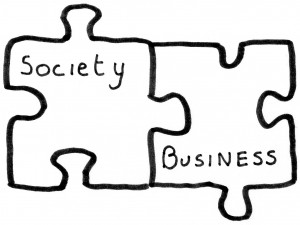Alibaba is an online retail service that has recently grown exponentially. There immense initial public offering and 40 % increase is a signal of great investor interest. I believe a key to Alibaba’s success is their unique business model. As we have learnt, inventory is an immense drain on a businesses ability to optimize usable capital; it also causes depreciation, and an inefficient supply process. Gaging the right balance between having an excess and a shortage of inventory is extremely tricky and can be a common downfall for businesses. So, are they necessary? Many experts would argue that they are, and label them as a “necessary evil” in business. However Alibaba has proven that with an innovation and creativity, they can eliminate this “evil” all together and incur all the benefits of not holding inventory. Alibaba employs a form of networking that connects merchants with consumers, where the merchants supply the products. They serve as a sort of liaison between buyer and seller, this model allows them to work in cooperation with their merchants instead of competing with them, and it allows them to avoid the costs of production and the disadvantages of inventory. Although all of this seems promising to Alibaba, my only worry is that with China’s extremely large and competitive market, their unique business model may soon be adopted by others which would eliminate their competitive edge.
Monthly Archives: October 2014
Inherent Shared Value
The concept of creating Shared Value is one that sparks my passion and interest.
I found it revolutionary to consider the concept of creating societal value first, and incurring economic value as an inevitability and side effect of that action. I truly admire companies for taking initiatives to incorporate Corporate Social Responsibility into their company procedures and value propositions. Whether it’s using sustainable materials, diverting profits to NGO’s, or sourcing ethically (Starbucks), it increases the companies appeal to me as a consumer. But the brands that resonate most deeply for me are those that have shared value within their original value propositions, and where the simple act of their daily activities as a business create benefit to society. These businesses inspire my entrepreneurial spirit to no end.
“Beyond Meat” is the perfect example of a company that has created a business from essentially helping consumers improve their own health, improve the environment, and improve the lives of animals.
These are values that are at the core of their operations, and it permeates their entire brand, and all their products. It’s not simply a marketing initiative, or a media campaign, instead it’s integral to their fundamental operations, and the values that they create are simply a bi-product of operating as usual. These businesses are the perfect representation of shared value and are businesses that I hope to one day emulate.
Lululemon Discouraging Health?
I’m a devoted Lululemon fanatic, however after reading Michelle’s post about their downsizing strategy, I’m admittedly disappointed. I agree with Michelle that this can be perceived positively as encouraging a healthy lifestyle, however I believe it does more damage both to their brand and to spreading the message of health. I am a passionate advocate of self-love, and in our perfection driven world, its something that is increasingly rare. The media already puts immense pressure on people to look “perfect”; getting that pressure from retailers is absurd. Not only is it demoralizing to be discriminating on consumers based on physicality, but it’s actually been shown to discourage health in the long run. Lululemon is also implicitly stating that size is an accurate depiction of health. This perspective neglects the holistic nature of health, and fails to recognize that everyone’s representation of physical health can look different. This business decision restricts the customer segment, unnecessarily discriminates against consumers, and discourages health for the most part. I believe a more effective way for Lululemon to encourage health would be to provide their products to those needing plus sizes. Having their workout clothes and being part of Lululemon’s community may incentivize those who are overweight to get active and start investing in their health.
Redefining the Retail Customer Experience
Certain retailers are beginning to utilize real-time data into their business strategies by personalizing the services they provide. They’re utilizing the new iBeacon technology to identify shoppers by their smartphones, thus gaining access to social media posts, and allowing them to tailor the shoppers experience to target their specific value proposition.
These actions responding to companies like Amazon’s incredible success analyzing consumer data. I believe this decision, to transition to a more real-time data model is a sensible one. As Rita McGrath has affirmed in her Transient Advantage article, it’s incumbent on businesses to keep re-evaluating their business strategies, as “sustainable advantages” are long gone in our ever evolving, competitive business world. She also advises businesses to consider arenas, which is what these retailers are doing. They’re not trying to imitate other retailers; rather they’re emulating the online retail service models use of the cloud database. Using real-time data will also encourage entrepreneurial growth since employees have a limitless creative capacity for improvements they can implement with their newfound wealth of information. In essence, this move allows retailers to be more knowledgeable on their consumer’s behaviour, reinforce and better their relationship with consumers, and therefore be better equipped to deliver targeted and effective value propositions to them.
A Hostile Operating Environment for Enbridge Leads to Unpromising Delays
The Supreme Court of Canada has made a definitive ruling, which recognizes the title that the Tsilhqot’in people have to their ancestral land in Williams Lake, BC. Their new-found authority over their land grants them the power to cancel projects that started without their consent. The Enbridge project had the federal cabinet issue an order to approve the project before gaining aboriginal consent, which now leaves them vulnerable and subject to legal cases. These court decisions have effectively stalled Enbridge’s development plans and left them in a more politically, legally, and culturally unstable operating environment. The increase in Aboriginal support and mounting legal hurdles implemented by the SCC could cause extreme delays and amendments to their previous plans. Enbridge will need to reassess their prospects, and reposition their company strategy. It’s clear that they must win-over the Aboriginal’s with land claims, and convince them of the benefit they’d receive from their project. This will be difficult seeing as the pipeline severely threatens the Aboriginal’s way of life and invades their land. The external public environment that BC offers isn’t particularly friendly to large corporations seeking to devastate land and threaten pollution, regardless of the financial gains.
Thus I believe Enbridge’s decision to seek other opportunities in more supporting environments will be more promising and productive.



